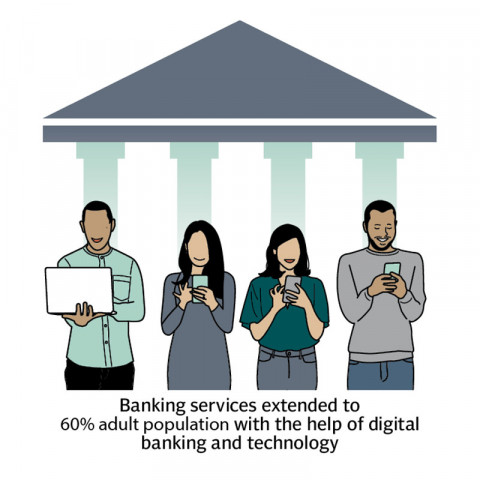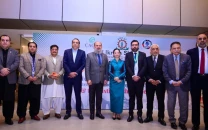SBP achieves 60% financial inclusion
Aims to lead National Financial Literacy Programme for adults and youngsters

Pakistan has significantly expanded the reach of banking services to encompass 60% of the adult population, including 43% female citizens. This achievement comes alongside the introduction and induction of innovative digital banking, underlining the belief that financial inclusion is a fundamental right that aids in alleviating poverty and fostering equitable economic growth.
The access to banking services has more than doubled compared to the recent past when it stood at 25-30% of the adult population. The Covid-19 pandemic played a pivotal role in accelerating the adoption of digital services in the country.
Speaking during an online address at the inaugural event of Pakistan Financial Literacy Week (PFLW) from March 4 to 8, themed ‘Digital Bankari – fori aur asaan (Digital Banking – Instant and Easy)’, organised by the State Bank of Pakistan (SBP) at its headquarters on Monday, Governor Jameel Ahmad said, “When more people have access to financial services, it creates a broad base of consumers, savers, and entrepreneurs, stimulating economic growth. Financial inclusion is a cornerstone of a thriving and equitable economy.”
“By providing individuals with the necessary knowledge and skills to manage their finances wisely, we empower them to break the cycle of poverty, plan for the future, and seize opportunities for economic development. Financial literacy enables people to make informed decisions about savings, borrowing, investing, entrepreneurship, and protecting themselves from financial risks.”
Ahmad highlighted the advancements in financial inclusion in Pakistan, attributing them to the initiation of the online banking journey, digital onboarding of customers, and the accessibility of banking services to unbanked and underbanked individuals through various digital platforms and technology. As of June 2023, there were approximately 177 million bank accounts in Pakistan. “Of these, 83 million are unique accounts, which constitute 60% of the 137 million adult population.”
It is noteworthy that women own a total of 49 million accounts, with 29 million being unique accounts, representing more than 43% of the female adult population.
The central bank is taking targeted steps to devise policies aimed at better integrating the female population into the formal financial system. The SBP governor underscored that, “Sustained economic growth is not possible if half of the population (women) is systematically excluded from the workforce.”
Read AMA propels financial inclusion in Pakistan, opening 7m accounts in 2023
To address historical gaps in the financial services industry, SBP has introduced the Banking on Equality Policy, complementing its National Financial Inclusion Strategy (NFIS) and other initiatives to provide better access to financial services for women.
Additionally, SBP is spearheading various initiatives in partnership with banks to provide equitable and easy access to a range of financial services, including RAAST, the instant national payment gateway, ASAAN Digital Account, ASAAN Mobile Account, and more recently, digital banks.
Finally, the SBP has introduced specialised schemes to enhance access to finance, such as the SME Asaan Finance or SAAF Scheme, the Refinance and Credit Guarantee Scheme for Women Entrepreneurs, the Line of Credit for MSMEs, and the Prime Minister’s Youth Business and Agriculture Loan Scheme. These initiatives have significantly advanced financial inclusion in Pakistan, bringing the total number of bank accounts to 60% of the 137 million adult population, according to SBP Governor Ahmad.
In this era of digitalisation, banks should leverage digital platforms to empower individuals with essential financial knowledge. Ahmad envisions a future where every citizen has access to banking services through smartphones, facilitating transactions, savings, and investments with ease.
In its strategic plan for the next five years, ‘SBP Vision 2028,’ SBP aims to strengthen the financial inclusion framework through targeted policy initiatives with an enhanced focus on digital means.
Ahmad stressed that financial literacy is the nation’s collective responsibility. Collaborating with the banking industry and academia, SBP is leading two iterations of the National Financial Literacy Programme (NFLP), one for adults and one for youngsters.
“These initiatives are instrumental in disseminating financial literacy to more than 2.9 million individuals, with over 50% female participation. Additionally, we witnessed an impressive 80% account opening rate among beneficiaries under NFLP,” he said.
Published in The Express Tribune, March 5th, 2024.
Like Business on Facebook, follow @TribuneBiz on Twitter to stay informed and join in the conversation.



















COMMENTS
Comments are moderated and generally will be posted if they are on-topic and not abusive.
For more information, please see our Comments FAQ